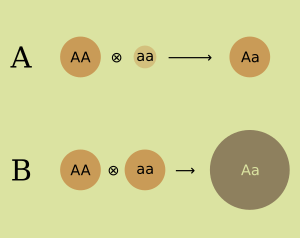Hybrid vigour facts for kids
Hybrid vigour (also called heterosis) is a special effect seen in nature. It means that the offspring of two different parents are often stronger, healthier, and grow better than either parent. Think of it like combining the best traits from two different families to make an even better mix!
This effect is the opposite of what happens with inbreeding. Inbreeding is when closely related animals or plants mate. This can lead to offspring that are weaker, less healthy, and don't live as long. But when parents from different groups mate, their offspring often become very strong and healthy. This is called outbreeding. People who breed animals have known about this for a long time, even since the 1700s. The famous scientist Charles Darwin also studied this effect in plants.
However, sometimes when parents are very different, like from different subspecies, the hybrid offspring might not be as strong. For example, a mule is a hybrid of a horse and a donkey. Mules are very tough and strong animals. But most mules cannot have babies of their own. In biology, if an animal cannot reproduce, it has "lower fitness." Scientists have worked hard to understand why hybrid vigour happens and why some hybrids are not fertile.
How Genes Explain Hybrid Vigour
When a group of animals or plants is small or has been inbred for many generations, it can lose its genetic diversity. This means there isn't much variety in their genes. This lack of variety can make them less healthy. Inbred groups often have many "bad" genes that are hidden.
Hybrid vigour, or heterosis, happens when you cross two different groups. The offspring often become much healthier and stronger than either parent. Scientists in the early 1900s, after understanding Mendel's laws of inheritance, came up with two main ideas to explain this.

- Dominance Hypothesis: This idea suggests that every living thing has two copies of most genes, one from each parent. Sometimes, one copy is "dominant" and can hide a "recessive" copy. If an inbred animal has two copies of a "bad" recessive gene, it can cause problems. But when you cross two different parents, the healthy dominant genes from one parent can cover up the bad recessive genes from the other. This makes the hybrid offspring healthier.
- Overdominance Hypothesis: This idea suggests that having two different versions of a gene (one from each parent) can sometimes be even better than having two identical copies. It's like having a special combination that works extra well. A famous example is how people with one copy of the sickle-cell anaemia gene are protected from malaria. This idea suggests that many genes working together in this "overdominant" way could cause hybrid vigour.
What Scientists Think Now
Today, most scientists believe that the dominance hypothesis is the main reason for hybrid vigour. It explains why inbreeding makes animals and plants less healthy and why hybrids are often so strong.
Scientists have also found that something called "epigenetics" might play a role in hybrid vigour, especially in plants and animals. Epigenetics involves changes that affect how genes work, but without changing the actual DNA code. Tiny molecules called microRNAs (miRNAs) are part of this. They can control how genes are expressed, and they might also help explain why hybrids are so vigorous.
Images for kids
See also
 In Spanish: Heterosis para niños
In Spanish: Heterosis para niños
 | Tommie Smith |
 | Simone Manuel |
 | Shani Davis |
 | Simone Biles |
 | Alice Coachman |

